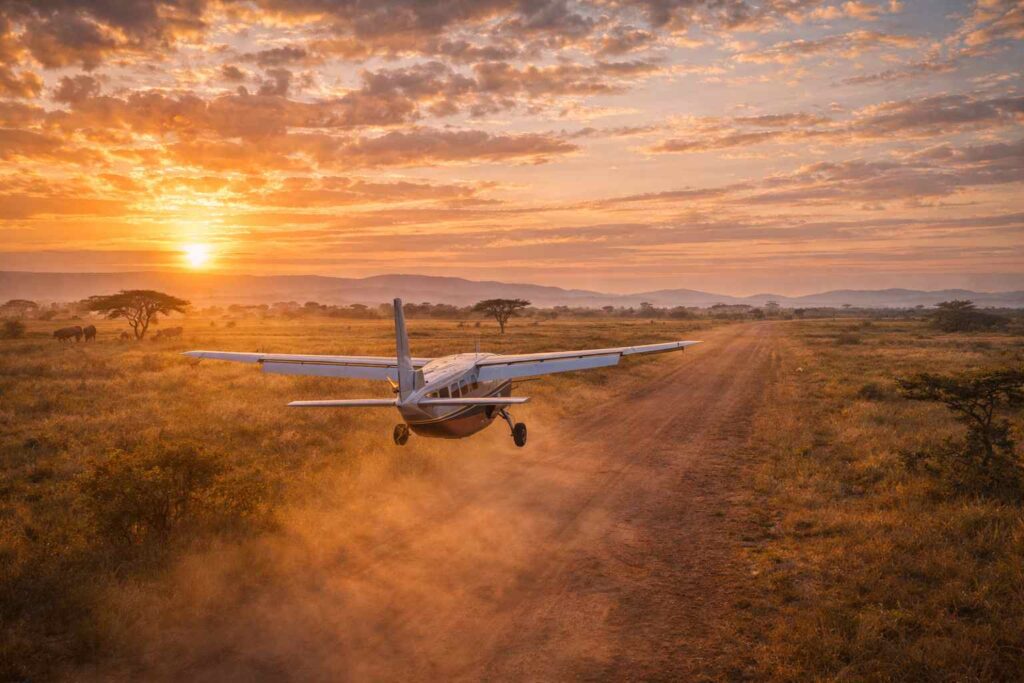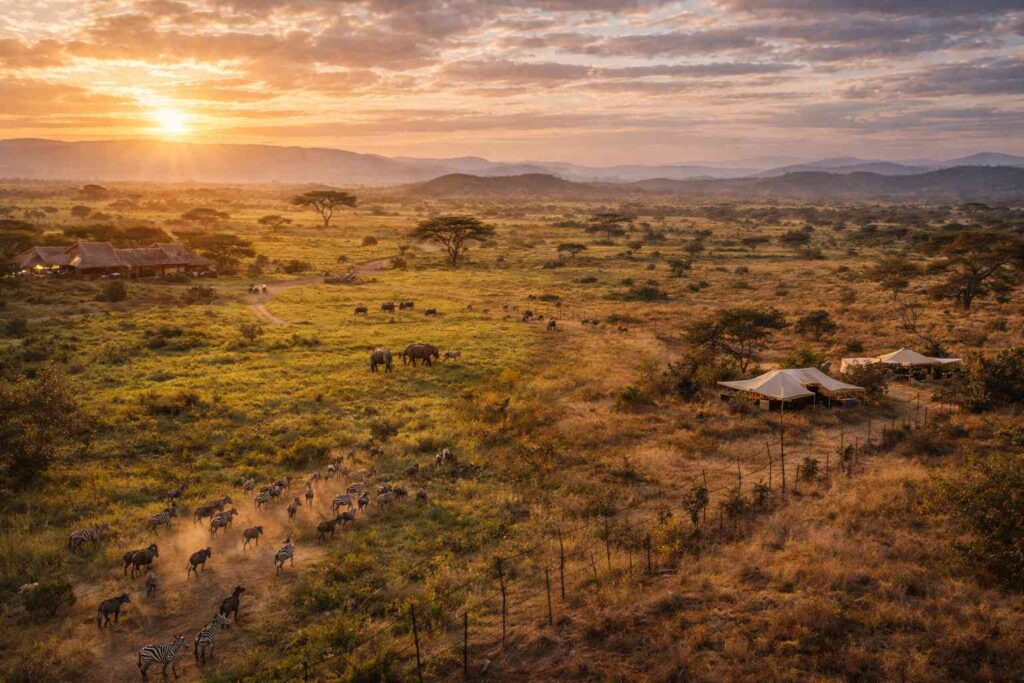Africa offers a multitude of safari experiences, each unique in its wildlife, landscapes, and cultural encounters. Selecting the right country for your safari adventure depends on various factors, including the type of wildlife you wish to see, the level of luxury you desire, your budget, and your travel experience. This guide provides insights into some of Africa’s top safari destinations to help you make an informed decision.
South Africa: Ideal for First-Time Safari-Goers
South Africa is renowned for its well-developed infrastructure, making it an excellent choice for first-time safari travelers. The country boasts a range of national parks and private reserves, offering diverse wildlife experiences.
Highlights:
- Kruger National Park: One of Africa’s largest game reserves, home to the Big Five and a variety of other species.
- Madikwe Game Reserve: A malaria-free zone, ideal for families and those seeking a more relaxed safari experience.
- Addo Elephant National Park: Famous for its large elephant populations and diverse ecosystems.
South Africa’s safari options range from self-drive adventures to guided luxury tours, catering to various budgets and preferences.
Kenya: Classic Safari Experience
Kenya offers the quintessential African safari experience, with its vast savannahs and abundant wildlife. The country’s rich cultural heritage and well-established tourism industry make it a favorite among travelers.
Highlights:
- Maasai Mara National Reserve: Known for the Great Migration and high concentrations of big cats.
- Amboseli National Park: Offers stunning views of Mount Kilimanjaro and large elephant herds.
- Lake Nakuru National Park: Famous for its flamingo populations and rhino sanctuary.
Kenya’s diverse landscapes and wildlife make it suitable for both first-time visitors and seasoned safari enthusiasts.
Tanzania: Witness the Great Migration
Tanzania is home to some of Africa’s most iconic safari destinations, offering unparalleled wildlife viewing opportunities. The country’s vast wilderness areas provide a sense of adventure and discovery.
Highlights:
- Serengeti National Park: Site of the annual Great Migration, where millions of wildebeest and zebras traverse the plains.
- Ngorongoro Crater: A UNESCO World Heritage Site, offering a unique ecosystem with a high density of wildlife.
- Selous Game Reserve: One of the largest faunal reserves in the world, known for its diverse habitats and species.
Tanzania’s safari experiences are often more remote and less crowded, appealing to those seeking a deeper connection with nature.
Botswana: Exclusive and Pristine Wilderness
Botswana is celebrated for its commitment to conservation and low-impact tourism, offering exclusive safari experiences in pristine environments.
Highlights:
- Okavango Delta: A UNESCO World Heritage Site, featuring a unique inland delta ecosystem teeming with wildlife.
- Chobe National Park: Known for its large elephant populations and diverse birdlife.
- Moremi Game Reserve: Offers a mix of dry land and wetland habitats, supporting a wide range of species.
Botswana’s high-end lodges and emphasis on sustainability make it ideal for travelers seeking luxury and solitude.
Namibia: Dramatic Landscapes and Unique Wildlife
Namibia offers a safari experience characterized by its dramatic desert landscapes and unique wildlife adaptations. The country’s vast open spaces provide a sense of solitude and adventure.
Highlights:
- Etosha National Park: Features salt pans and waterholes attracting diverse wildlife, including rare black rhinos.
- Skeleton Coast: Known for its rugged coastline, shipwrecks, and desert-adapted animals.
- Namib-Naukluft National Park: Home to the towering dunes of Sossusvlei and unique desert ecosystems.
Namibia’s self-drive safari options and striking scenery appeal to independent travelers and photographers.
Uganda and Rwanda: Primates and Rainforest Safaris
For those interested in primate encounters, Uganda and Rwanda offer exceptional opportunities to observe mountain gorillas and chimpanzees in their natural habitats.
Highlights:
- Bwindi Impenetrable Forest (Uganda): A UNESCO World Heritage Site, home to nearly half of the world’s mountain gorilla population.
- Volcanoes National Park (Rwanda): Offers gorilla trekking experiences in a scenic volcanic landscape.
- Kibale National Park (Uganda): Known for its high density of chimpanzees and diverse primate species.
These countries provide immersive rainforest experiences and are ideal for travelers seeking unique wildlife encounters.
Zambia and Zimbabwe: Off-the-Beaten-Path Adventures
Zambia and Zimbabwe offer authentic safari experiences with fewer tourists, providing a sense of exploration and discovery.
Highlights:
- South Luangwa National Park (Zambia): Renowned for walking safaris and abundant wildlife.
- Hwange National Park (Zimbabwe): Home to large elephant herds and diverse habitats.
- Victoria Falls: One of the world’s largest waterfalls, offering a range of adventure activities.
These destinations are suitable for travelers seeking a more rugged and intimate safari experience.
Comparative Overview of Safari Destinations
To assist in your decision-making, here’s a comparative overview of the discussed safari destinations:
| Country | Best For | Key Highlights | Travel Experience Level |
|---|---|---|---|
| South Africa | First-time travelers | Big Five, self-drive options, family-friendly parks | Beginner |
| Kenya | Classic safari experience | Great Migration, cultural interactions | Beginner to Intermediate |
| Tanzania | Iconic wildlife spectacles | Serengeti, Ngorongoro Crater | Intermediate |
| Botswana | Exclusive, luxury safaris | Okavango Delta, low-impact tourism | Advanced |
| Namibia | Unique landscapes, self-drive | Etosha, desert-adapted wildlife | Intermediate to Advanced |
| Uganda/Rwanda | Primate trekking | Mountain gorillas, rainforest ecosystems | Intermediate |
| Zambia/Zimbabwe | Off-the-beaten-path adventures | Walking safaris, Victoria Falls | Intermediate to Advanced |
Final Thoughts
Choosing the right African safari destination depends on your personal preferences, interests, and travel experience. Whether you’re seeking the classic Big Five experience, unique wildlife encounters, or off-the-beaten-path adventures, Africa offers a safari destination to match every traveler’s dream. Consider factors such as wildlife diversity, landscape, level of luxury, and cultural experiences when making your decision.
Frequently Asked Questions
Visa policies vary by country and nationality. For example, Kenya and Tanzania offer e-visas, while South Africa may not require one for some travelers. Always check with the embassy or an official government website before traveling.
Yes, some destinations require or recommend vaccinations such as yellow fever, hepatitis A/B, and typhoid. Malaria prophylaxis is also highly recommended in many safari regions.
Many safari lodges and operators are well-equipped to host solo travelers. For safety and social interaction, joining a group tour or choosing a guided lodge-based safari is often best.
Budgets vary widely. A basic safari might cost $150–$300/day, while luxury experiences can exceed $1,000/day. Costs depend on destination, travel style, season, and inclusions like guides, meals, and park fees.
Absolutely. Many travelers combine safaris with beach destinations like Zanzibar (Tanzania), the Seychelles, or Mozambique. These combos offer a relaxing contrast to wildlife adventures.
The dry season (typically June–October) offers excellent visibility and animal concentration at waterholes. However, the green season (Nov–March) provides vibrant landscapes, dramatic skies, and baby animals—perfect for photography.






